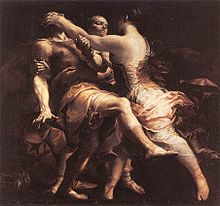Hecuba (play)
| Hecuba | |
|---|---|

Hecuba Blinding Polymestor by Giuseppe Maria Crespi
|
|
| Written by | Euripides |
| Chorus | Captive Trojan Women |
| Characters | Ghost of Polydorus Hecuba Polyxena Odysseus Talthybius Maid Agamemnon Polymestor, and his children |
| Place premiered | Athens |
| Original language | Ancient Greek |
| Genre | Tragedy |
| Setting | Greek camp upon the shore of the Thracian Chersonese |
Hecuba (Ancient Greek: Ἑκάβη, Hekabē) is a tragedy by Euripides written c. 424 BC. It takes place after the Trojan War, but before the Greeks have departed Troy (roughly the same time as The Trojan Women, another play by Euripides). The central figure is Hecuba, wife of King Priam, formerly Queen of the now-fallen city. It depicts Hecuba's grief over the death of her daughter Polyxena, and the revenge she takes for the murder of her youngest son Polydorus.
In the play's opening, the ghost of Polydorus tells how when the war threatened Troy, he was sent to King Polymestor of Thrace for safekeeping, with gifts of gold and jewelry. But when Troy lost the war, Polymestor treacherously murdered Polydorus, and seized the treasure. Polydorus has foreknowledge of many of the play's events and haunted his mother's dreams the night before.
The events take place on the coast of Thrace, as the Greek navy returns home from Troy. The Trojan queen Hecuba, now enslaved by the Greeks, mourns her great losses and worries about the portents of her nightmare. The Chorus of young slave women enters, bearing fateful news. One of Hecuba's last remaining daughters, Polyxena, is to be killed on the tomb of Achilles as a blood sacrifice to his honor (reflecting the sacrifice of Iphigenia at the start of the war).
Greek commander Odysseus enters, to escort Polyxena to an altar where Neoptolemus will shed her blood. Odysseus ignores Hecuba's impassioned pleas to spare Polyxena, and Polyxena herself says she would rather die than live as a slave. In the first Choral interlude, the Chorus lament their own doomed fate, cursing the sea breeze that will carry them on ships to the foreign lands where they will live in slavery. The Greek messenger Talthybius arrives, tells a stirring account of Polyxena's strikingly heroic death, and delivers a message from Agamemnon, chief of the Greek army, to bury Polyxena. Hecuba sends a slave girl to fetch water from the sea to bathe her daughter's corpse.
...
Wikipedia
